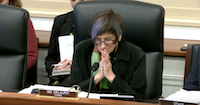House Holds Hearing on Federal Loan Servicer Oversight After Concerning OIG Report
By Joelle Fredman, NASFAA Staff Reporter
The House appropriations subcommittee overseeing education held a hearing Wednesday to learn more about a report released last month that identified a host of issues regarding the Office of Federal Student Aid’s (FSA) oversight of federal student loan servicers, and to hear from higher education experts about ways to help borrowers struggling with debt.
In the report, which was conducted by the Department of Education’s (ED) Office of the Inspector General (OIG), OIG found that between January 2015 and September 2017, service representatives were not sufficiently informing borrowers of all their available repayment options. For example, Navient, one of the current nine federally-contracted loan servicers, was found to be overwhelmingly placing borrowers into forbearance, instead of offering other solutions, which took place in roughly 9 percent of its calls in the span of one month. OIG also reported that team members responsible for monitoring calls between servicers and borrowers were not always submitting full reports of the phone calls. This was the case for 8.2 percent of reviews during a three-month period.
OIG made six recommendations in its report for FSA, including that FSA track all instances of noncompliance by loan servicers to hold them accountable, share results of FSA-performed oversight activities over servicers, and create a monitoring system that ensures complete and accurate reporting. FSA responded that it would comply with the recommendations.
Rep. Rosa DeLauro (D-CT), chair of the House Subcommittee on the Departments of Labor, Health and Human Services, Education, and Related Agencies, told a room full of lawmakers Wednesday that loan servicers “are paid by ED to serve our students, but we are increasingly seeing evidence that they do not.”
“A new report by the inspector general found that these loan servicers are failing—even potentially cheating borrowers—and ED is asleep at the wheel,” DeLauro said.
During the hearing, Bryon Gordon, ED’s assistant inspector general who contributed to the report, summarized his findings and was questioned by Democratic lawmakers as to why loan servicers were continuing to operate without much oversight. A few Republican lawmakers, however, argued that because FSA agreed to comply with OIG’s recommendations this hearing was premature.
"Why aren't we waiting until your next audit to criticize the agency for noncompliance?" Rep. Andy Harris (R-MD) asked.
The lawmakers also heard from a panel of higher education experts on how issues with loan servicers have harmed students, including Joanna Darcus from the National Consumer Law Center, who said that she works with borrowers daily who have suffered because of misinformation from their loan servicers.
“Currently borrowers are the only ones being held accountable when something goes wrong,” Darcus said. “Servicers have been systematically failing to keep borrowers current. People routinely fall behind because of lost or improperly processed paperwork, borrowers struggle to make unaffordable payments because servicers routinely fail to inform them about income-driven repayment, and borrowers miss out on program benefits like Public Service Loan Forgiveness (PSLF) as a result.”
Darcus told lawmakers—in response to a question from Ranking Member Rep. Tom Cole (R-OK) about why loans are given out to students in the first place—that one solution to this issue would be to prioritize grants over loans, especially at institutions that serve large proportions of low-income students.
Colleen Campbell from the Center for American Progress (CAP) told lawmakers that this report highlights the lack of transparency within FSA, and that more data on loan servicers was needed to better identify problems within the current system.
“If the public had more say in these processes, and if there was more data available so that we could better evaluate these programs, then we would be able to consistently shed light on what’s going on at FSA, rather than relying on audits and oversight activities in order for these things to come out and then try to fix them retroactively,” Campbell said.
All of the panelists—which also included Shennan Kavanagh from the Consumer Protection Division at the Office of Massachusetts Attorney General Maura Healey, and Preston Cooper from the American Enterprise Institute (AEI)—agreed that Congress should also tackle the issue of institutional accountability when it comes to preparing students with the skills they need to succeed in the labor market and repay their debt.
NASFAA published a report in 2017 that also included recommendations for better oversight and transparency at FSA.
“This is an issue that needs continued and vigorous oversight,” DeLauro concluded. “We owe it to students, we owe it to the taxpayers, [and] it falls under our jurisdiction. … We are going to follow up with the inspector general.”
Publication Date: 3/7/2019






David S | 3/7/2019 12:48:43 PM
Anyone who's ever been through a program review sees a recommendation that the Department of Ed hold an entity accountable for noncompliance and shakes their head.
You must be logged in to comment on this page.